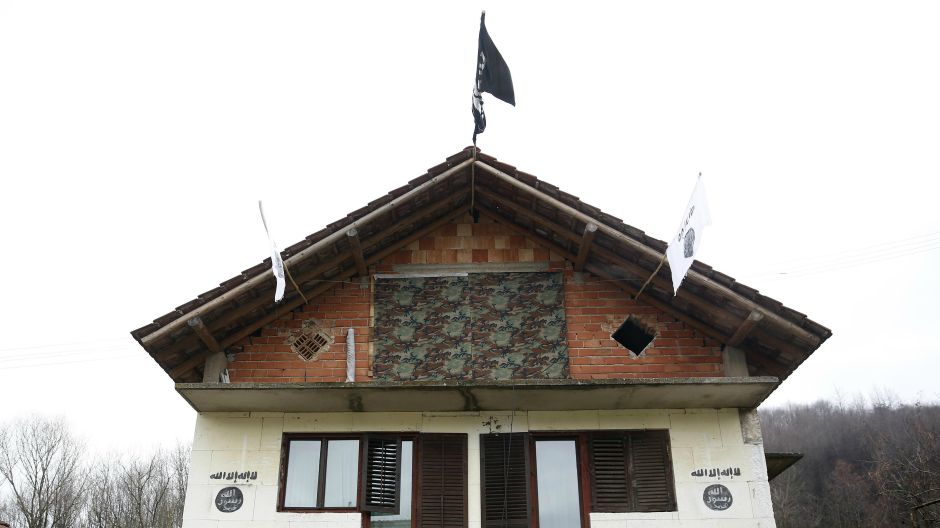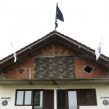
The Islamic State’s Balkan ‘Strongholds’
Publication: Terrorism Monitor Volume: 13 Issue: 20
By:

To the Islamic State militant group, foreign fighters from the Balkans have particular importance due to their historical ties to Islam, their homelands’ proximity to other Western Europe and because ethnic disputes in the region remain close to the surface. A video released in June 2015 by the organization’s al-Hayat media center, for instance, emphasizes the strategic importance of the Balkan Peninsula to the Islamic State by lengthily analyzing the historical significance Balkan Muslims purportedly had in defying “European crusaders” during the Ottoman Empire, as well as enduring hardships during Enver Hoxha’s and Josip Broz Tito’s Communist regimes in Albania and Yugoslavia respectively. [1] In the last issue of Dabiq, the Islamic State’s English language magazine, the jihadist organization again continued to refer to the importance of the Balkans and also calls for its followers in the region to conduct lone wolf attacks. [2]
The region’s Muslim communities in Albania, Kosovo and Bosnia still largely practice a moderate vision of Islam, based on Hanafi jurisprudence and Sufi traditions inherited from decades of Ottoman rule. However, Saudi-led efforts following the fall of the region’s communist regimes have attempted to make the Balkans a bastion of Salafist and Wahhabist doctrines and practice. One outcome of this process is that in the last two years, over 1,000 foreign fighters from the Western Balkans have joined the Islamic State in Syria and Iraq (Illyria Press, August 7). These recruits come from Muslim communities throughout the region, including Albania, Kosovo, Bosnia and Herzegovina, Serbia and Montenegro.
During the past year, the authorities in the region have conducted a series of arrests of groups and individual imams purportedly involved in inspiring and facilitating the flow of foreign fighters to the Islamic State. In Albania, for instance, the authorities undertook a series of security operations in March 2014 against an alleged network of recruiters based in two mosques on the outskirts of the capital Tirana, and arrested nine individuals on grounds of facilitating recruitment for terrorism, financing of terrorist activities. These included two imams allegedly instrumental in radicalizing the group’s followers. In addition, since August 2014, the security authorities in Kosovo have arrested and questioned over 100 individuals during investigations into the recruitment of young Albanian men and women from Kosovo to the Islamic State (Gazeta Express [Prishtina], January 17). Similar operations have been conducted in Macedonia, Bosnia and Serbia against individuals accused of involvement in militant recruitment on behalf of the Islamic State. Although most of these policing operations have proved successful in identifying and isolating the main lines of militant recruitment, questions remain over the continuity of hardline religious doctrine in these areas and ways it is being utilized to establish strongholds of support among smaller communities in the countries most affected. Even though most countries in the region remain keen to join the European Union (EU), high levels of corruption, organized crime and a weaker and less appealing EU have created an environment where hardline ideologies can spread, especially in countries with predominantly Muslim populations, such as Kosovo or Bosnia. The lack of preventative measures against this radical upswing may potentially make religious radicalism one of the region’s greatest security threats, alongside organized crime.
Islamic State ‘Strongholds’
Weak governance and poor rule of law, and a corresponding limited government presence in remote areas, is a problem common to many Balkan countries. Communal anger over high levels of unemployment and extensive government corruption has been further stoked by a widespread dissatisfaction with a prolonged EU integration process. These elements have accordingly become the centerpiece of the grievance narrative that many Islamist leaders have promoted in order to gain local support and fuel anti-Western and anti-government sentiments among their followers. In addition, this dissatisfaction with the status quo also explains the gradual increase in people from Kosovo and Albania migrating to Western Europe in hopes of finding employment. For instance, Albanian migrants rank third after Syrians and Afghans seeking asylum in Germany (Panorama [Tirana], September 19).
As state institutions lack credibility, radical imams and similar groups are filling the vacuum, while additionally replacing moderate religious leaders and other societal actors in these communities. Several testimonies from local civil society groups based in northeastern Albania, for instance, describe the rapid transformation of local religious life and an increased commitment towards following imams among youths, whose lives are increasingly shaped by religious doctrine in the absence of a strong school system and meaningful employment opportunities. [3] Similarly, a recent report found that youth in Kosovo are also becoming increasingly conservative, while their main reference points for spiritual and intellectual guidance are also imams [Tema [Tirana], August 10). While religiosity was already an integral component of a society that has historically promoted peaceful co-existence between religions, many in Kosovo have gradually embraced Salafist and Wahhabist ideologies, leading to a shift in their views and attitudes, while hundreds of religious hardliners from Kosovo have also joined the Islamic State in recent years. Kacanik, a small town in Kosovo near the border with Macedonia, is a particular example of where radical religious rhetoric has flourished and despite recent efforts to curb its influence, many radical imams in the area are still able to carry on giving sermons to radical youth despite being in hiding from the authorities (Telegrafi [Prishtina], September 1, Telegraph, August 23).
In addition to Balkan youths’ changing approach to religion, hardliners sympathetic to the Islamic State have apparently also established a physical presence in the region by purchasing vacant real estate along the former lines of contact between the local warring factions in the 1990s conflicts. This has been particularly visible in Bosnia, where these types of properties are often in badly damaged remote areas that have been abandoned by state authorities (Avaz [Sarajevo], May 28). According to another report, this one on Bosnian fighters in Syria, these types of purchases are common among local Salafists, and many known Islamic State foreign fighters from Bosnia have visited these villages in the past. [4] Current communities inhabiting these villages do not shy from advertising their support for the Islamic State, either via flying the group’s flags or through displaying other symbols of the group (Localno [Skopje], May 28).
Organized Crime and Religious Radicalism
Although most regional security officials and security experts treat the threats posed by religious extremism and organized crime as separate concerns—growing out of separate networks—there are strong possibilities that these two elements may combine in future, as Islamist groups, such as the Islamic State, attempt to establish their presence in other parts of Europe. Throughout the past year, for instance, there have been several media reports and events that reflect that such combination is possible in a region marked by trafficking, prostitution and political links to organized crime.
This emerging nexus between criminals and religious radicals is particularly visible in Lazarat, a village in southern Albania infamous for its production and export of cannabis. There have been several instances of unrest in the area, with authorities issuing arrest warrants for five young men allegedly responsible for a series of explosions near Lazarat in March, which resulted in no reports of death or injuries (BalkanWeb, May 23). Facebook profiles in the name of the five men showed that they were vocal supporters of the Islamic State, but also led glamorous lives, involving expensive cars and Mediterranean trips, despite outstanding domestic and international arrest warrants. Arbion Aliko, one of the main individuals involved, was apprehended in June, following a shootout between the young men and police, on charges of carrying out acts for terrorist purposes and over the killing of Ibrahim Basha, a special forces officer on duty in Lazarat. According to a Facebook profile in Aliko’s name, which was later taken down, he expressed his admiration for Lavdrim Muhaxheri (an infamous Albanian-Kosovar jihadist with the Islamic State), and other known Albanian jihadists reportedly fighting for the jihadist organization. Aliko had also repeatedly called for action to take back Lazarat from state control. [5]
Although direct links between organized criminal groups and IS supporters in Albania were denied by the authorities, these events exposed the potential for organized crime to converge with religious radicalism and violent extremism in Albania (BalkanWeb, June 29). The events in Lazarat shocked public opinion in Albania, but they also suggest the possible emergence of other nexuses between radicals and active criminal groups elsewhere in the country. Albania has a long history of being a transit and destination country for cannabis, heroin and cocaine, and also has long been considered a source country for cannabis going to EU countries. The Albanian government has sought to tackle this problem; for instance, in 2014, Albanian police undertook a massive raid on Lazarat that was intended to end the village’s production and export of cannabis to Western Europe. However, although Albania’s interior minister, Saimir Tahiri, has recently claimed that almost all marijuana plants in northern and southern parts of the country, which are particularly known for their high production of cannabis, were destroyed as a result of police operations, questions remain over who managed these areas and profited from their lucrative revenues (Fax [Tirana], August 16). On the other hand, for hundreds of local residents, drug production is a valuable source of income in the absence of other employment opportunities, and the destruction of these plantations poses an economic threat to them due to the lack of alternatives. These areas are particularly vulnerable to the influence of radical religious leaders, as well as criminal groups that still maintain their own influence, in absence of police control and weak institutions. This situation illustrates that efforts to tackle the drugs trade also risk boosting radicalization.
Conclusion
Convergences between organized crime groups and traditional terrorist organizations are nothing new. Frequent evidence of direct linkages is seen between terrorist organizations and criminal networks who seek to capitalize upon each others’ skills and assets, despite divergences in ideologies and objectives. For instance, the U.S. National Security Council has said that “today’s criminal networks are fluid, striking new allegiances with other networks around the world and engaging in a wide range of illicit activities, including cybercrime and providing support for terrorism.” [6] Although details of direct links between the Islamic State and organized groups in Albania, especially since the recent events in Lazarat, are not confirmed, the rampant corruption in all sectors of society, including the judiciary, and allegations of prostitution and drug links to the political establishment mean that Albania and the rest of the Balkan region are particularly vulnerable to extremist groups looking to establish their presence in Europe. In addition, according to several unofficial sources, in Albania in particular, political polarization and electoral fraud have led religious leaders to support particular political agendas in exchange for delivering votes, thus leading to the willingness of authorities and politicians to overlook illicit activities that these individuals may be involved in. This underlines that high levels of corruption at administrative and political levels in affected Balkan countries can create additional vacuums in which religious radicalism can take hold, potentially increasing threats not only in the region itself but also further afield.
Ebi Spahiu is a researcher on Central Asian and Western Balkan Affairs, focusing on gender and religious extremism.
Notes
2. “An Opportunity for Noble Deeds,” Dabiq (August), pg. 54.
3. Author’s own discussions with civil society representatives based in different regions in Albania, September 2015.
4. “The Lure of the Syrian War,” The Atlantic Initiative https://atlanticinitiative.org/images/THE_LURE_OF_THE_SYRIAN_WAR_THE_FOREIGN_FIGHTERS_BOSNIAN_CONTINGENT/The_Lure_of_the_Syrian_War_-_The_Foreign_Fighters_Bosnian_Contingent.pdf.
5. Arbion Aliko Lazarat, Facebook profile https://www.facebook.com/ar.al.18?fref=ts.
6. “Strategy to Combat Transnational Organized Crime,” U.S. National Security Council, https://www.whitehouse.gov/administration/eop/nsc/transnational-crime/strategy.





